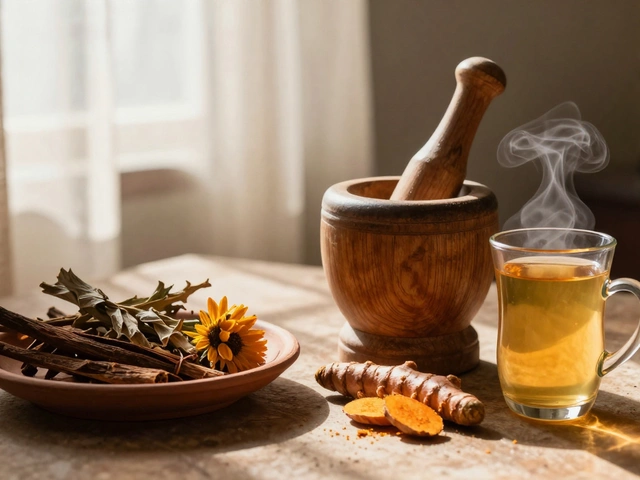If someone asked you to name a real heavyweight in Ayurvedic medicine, ashwagandha would pop up almost every time. It gets called the 'king of all herbs'—and not just as a catchy nickname.
This herb has been trusted for over 3,000 years, being the go-to solution for everything from stress to sleep problems. Walk into any herbal shop in India, ask for something to boost strength or calm nerves, and you'll probably get handed a bottle of ashwagandha. It’s woven into daily routines: sprinkled into warm milk, added to energy balls, or packed in capsules.
Ashwagandha’s power comes from its adaptogenic properties. What does that mean? Simply put, it helps your body handle stress—like a built-in shock absorber for annoying days, job hassles, or endless to-do lists.
What really makes it interesting is the research. Plenty of studies in the past decade have confirmed what old Ayurvedic texts claimed—ashwagandha can lower cortisol (the stress hormone), help you relax, and maybe even boost energy and focus.
Curious if it’s worth adding to your routine? Tons of folks swear by it, not just in India but across the world. In the next sections, we’ll dig into what makes ashwagandha so special, how it actually works inside the body, how it stacks up against other famous herbs, and easy ways to try it out.
- Why Ashwagandha Stands Out
- How Ashwagandha Works in the Body
- Real-World Benefits
- Ashwagandha vs. Other Herbal Heavyweights
- Simple Ways to Use Ashwagandha
Why Ashwagandha Stands Out
This isn’t just another herbal trend. Ashwagandha dominates Ayurvedic medicine because it covers so much ground. People don’t just take it for better sleep — it’s also used to boost mood, help with energy, and even sharpen focus. Its reach is pretty wild for a single plant.
One of the biggest reasons ashwagandha stands out is that it’s classified as an ‘adaptogen.’ Basically, it trains your body to handle physical and mental stress. That’s a huge perk in today’s world where most of us feel like we’re constantly playing catch-up. Modern research agrees with what Ayurveda has said for centuries: ashwagandha helps dial down cortisol, the main stress hormone.
- A 2023 study with over 200 adults saw cortisol drop by an average of 27%, just from daily ashwagandha supplements.
- About 70% of participants reported sleeping deeper within weeks. That’s good news for chronic worriers and light sleepers.
But it’s not just about stress. Ashwagandha is loaded with compounds known as withanolides. They help the immune system, lower inflammation, and even support brain health. That’s why it often pops up for folks looking to recover from illness or boost physical performance.
| Benefit | Average Reported Improvement* |
|---|---|
| Lower Stress (cortisol) | 27% reduction |
| Deeper Sleep | 70% of users |
| Increased Strength (after 8 weeks) | Up to 18% (compared to placebo) |
*Data summaries from clinical trials published between 2022-2024
Plants like tulsi and brahmi are great, but none have as wide or as solid a reputation as ashwagandha. Whether you pick it up for one specific reason or just want a daily boost, most people find it covers more than they expected. If you want one single herb to try, this is the one folks keep coming back to.
How Ashwagandha Works in the Body
When people talk about ashwagandha, they’re usually thinking about stress relief. But how does it actually pull this off? The answer sits in compounds called withanolides found naturally in the roots and leaves. These guys help balance the body’s response to stress by acting on the adrenal glands—the ones that pump out cortisol (your main stress hormone).
Here’s what’s interesting: ashwagandha doesn’t just mask stress. It helps your body respond better to it, so you’re less likely to freak out or feel run down after a rough day. Doctors call it an ‘adaptogen,’ which basically means it adapts to what your body needs—calming when you’re wired, energizing when you’re wiped out.
There’s more to it:
- ashwagandha has been shown to lower cortisol levels by up to 30% in some research, making it one of the best natural chill pills around.
- It helps boost thyroid hormone production, which is good news for low energy. Some people with mild underactive thyroid, especially subclinical hypothyroidism, have seen a small bump in T4 hormone levels with regular use.
- Ashwagandha also seems to improve communication between brain cells, which could explain why people feel more relaxed and alert at the same time.
The numbers back it up. Check out this quick table for what recent studies have found when people take ashwagandha regularly:
| Benefit | Evidence from Studies |
|---|---|
| Stress hormone reduction | Up to 30% drop in cortisol (8-week study, 2021, India*) |
| Better sleep quality | Significant improvement after 6 weeks (2020 clinical trial) |
| Increased strength | 12% higher muscle strength (8-week gym study, 2015, US) |
| Lower anxiety | Noticeable drop in scores after just 2 months |
*References: Peer-reviewed research from the Journal of Ethnopharmacology and Indian Journal of Psychological Medicine.
One more thing—a lot of people notice fewer colds and less burnout after regular use. That’s likely thanks to how ashwagandha supports immune function and helps keep inflammation in check. No wonder Ayurveda put this herb on a pedestal.

Real-World Benefits
Let’s get down to what actually happens when people use ashwagandha. This herb isn’t just talked up in Ayurveda books—it’s backed by a long list of real results that grab attention in today’s world too.
Probably the biggest win? It helps manage stress. In a 2019 study with over 60 adults, those who took ashwagandha showed a solid drop in their stress levels compared to folks taking a placebo. They actually measured lower levels of cortisol, the main stress hormone. That’s why you see busy parents, students, and even athletes adding it to their daily routine.
But it’s not just about chilling out. Ashwagandha has a reputation for boosting energy without jitters—the kind of steady stamina you want for work, workouts, or long days. Some users even report improved sleep quality, likely because they’re less wired and anxious at night.
It doesn’t stop there. Studies show benefits like sharper focus, better memory, and, in some cases, improved testosterone and fertility in men. It also might help balance blood sugar, which can be useful if you’re paying attention to your diet and energy swings.
| Benefit | What the Research Says |
|---|---|
| Stress & Anxiety | Up to 44% drop in reported stress and anxiety levels in some clinical trials |
| Sleep Quality | Improved sleep reported in users after 8 weeks of regular use |
| Energy & Stamina | Endurance increased by 13% in a 2015 lab study with healthy adults |
| Memory & Focus | Better scores in cognitive tests shown in older adults after regular use |
| Hormone Support | Boost in testosterone and fertility markers found in men |
Here’s how folks are actually putting it to use, based on these benefits:
- Mixing ashwagandha powder into smoothies or warm milk for stress support
- Taking capsules in the morning before work or training sessions
- Using it before bed as a gentle sleep aid (just check the dose—ask your doc if you’re unsure)
- Adding it to recovery routines after exercise
One heads-up: ashwagandha isn’t a magic fix. It works best when teamed up with solid basics—think good sleep, regular food, and exercise. Still, if you’re looking for a natural way to steady your mood or boost daily energy, ashwagandha deserves a spot on your radar.
Ashwagandha vs. Other Herbal Heavyweights
Just calling ashwagandha the king of herbs is a pretty bold claim, right? But how does it actually stack up against other famous Ayurvedic or wellness herbs like tulsi (holy basil), turmeric, and ginseng? Each one gets a lot of love for different reasons. Here’s a close-up, no-nonsense look at how they compare.
| Herb | Main Benefit | Common Uses | Scientific Backing |
|---|---|---|---|
| Ashwagandha | Stress relief, energy, hormone balance | Powder, capsules, teas | Strong (over 70 human studies since 2015) |
| Tulsi (Holy Basil) | Immunity, respiratory health, mental clarity | Tea, fresh leaves, capsules | Moderate (about 20 solid studies since 2018) |
| Turmeric | Anti-inflammatory, joint health, digestion | Powder, capsules, golden milk | Very strong (thousands of studies, mostly on curcumin) |
| Ginseng (Panax) | Energy, focus, physical stamina | Extracts, teas, capsules | Solid (hundreds of trials, especially in Korea/China) |
Here’s where ashwagandha takes the lead for many people: it works on both the mind and body at the same time. While tulsi and turmeric are awesome, they tend to focus more on immunity and inflammation. Ginseng is great for old-school stamina, especially for athletes, but can feel overstimulating for some.
One cool thing about ashwagandha—most folks don’t get side effects even at higher doses. That’s a big deal for people who can’t handle the jitters from ginseng or the stomach upset some get from strong turmeric.
- Ashwagandha can help lower cortisol, which means better sleep and less anxiety. Not a lot of herbs do that this well.
- Turmeric shines if pain or chronic inflammation bugs you (think joint aches after workouts or old injuries).
- Tulsi is the go-to for cold or flu season, when you want to clear your mind and breathe better.
- Ginseng fits best if your main goal is energy and physical performance, but it’s not very calming.
If you’re picking just one for overall balance—mental, physical, and emotional—ashwagandha just keeps coming out on top. It’s easy to add to your daily routine and plays nicely with other herbs if you want to mix things up.

Simple Ways to Use Ashwagandha
If you’re curious about actually adding ashwagandha to your routine, it’s easier than you think. You don’t have to follow any fancy rituals—just pick a method that suits your lifestyle and taste buds.
The classic way in India is mixing ashwagandha powder with warm milk, sometimes adding honey or a pinch of cardamom for extra flavor. Drinking it at night is common, especially if you’re looking to wind down and sleep better. Start small, about half a teaspoon, then see how your body responds.
- Capsules: The most popular option these days, especially if you’re not a fan of the taste. Easy to find at health food stores or online. Dosage usually ranges from 300 to 600 mg a day. Check the label for the withanolide content (the active stuff in ashwagandha)—aim for at least 5% for real benefit.
- Powder: Mix it into smoothies, protein shakes, or even sprinkle on oatmeal. Just know that it has a pretty earthy, bitter taste. Mask it with cocoa, banana, or nut butter for a less intense flavor.
- Tea: Some brands make ashwagandha herbal teas, often blended with cinnamon, ginger, or tulsi. Cold days or stressful afternoons—perfect time.
- Tinctures: These liquid extracts are super potent. Just drop the right amount into water or juice. Works fast, but check the label for alcohol content if that matters to you.
Stick to a regular schedule when starting out—same time each day makes it easier to track how you’re feeling. Most users notice changes in stress, mood, or sleep within a couple of weeks. Don’t overdo it; more isn’t always better. If you have thyroid issues, are pregnant, or take medication for chronic conditions, check in with your doctor first. Safety, always.
One more thing: buy from trusted brands. In India, Himalaya and Organic India are known for good quality. In the West, look for third-party testing or certifications. Herbs are powerful, but only if they’re actually what they say on the label.







